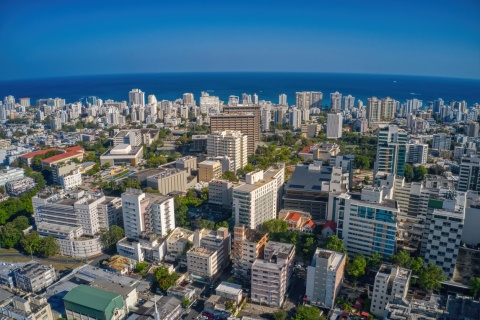Hire anywhere—No entity required
Start hiring nowSo you’re scaling your company, and suddenly you need talent. Not just any talent; the kind that speaks two languages fluently, costs less than Silicon Valley, and operates under U.S. labor protections. Enter Puerto Rico.
Here’s what most hiring managers don’t realize: this Caribbean island just ranked #5 globally for hiring growth among 42 countries and territories. While your competitors wrestle with H-1B visa quotas and remote work tax headaches, hiring in Puerto Rico offers something almost too good to be true.
Picture this: you hire a brilliant software developer in San Juan who speaks perfect English and Spanish, works in your time zone, gets paid in U.S. dollars, and falls under familiar U.S. employment laws. No visa paperwork. No currency fluctuation and conversion nightmares. No wondering if your remote work setup violates some obscure tax regulation in a country whose legal system you don’t understand.
Puerto Rico’s tech sector alone has grown by 25% since 2020, with 15,000 new positions expected this year. Recent legislation like Law 52-2022 has “provided increased flexibility for foreign employers and employees, allowing remote work without the burden of local employment laws and tax obligations,” according to Carlos G. Colόn-Machargo and Skye Hao, global employment attorneys at Ogletree Deakins.
In other words, it’s now even easier for foreign employers to hire Puerto Rican talent without establishing a physical presence. Companies are discovering what feels like a hiring cheat code—all the benefits of international talent acquisition with none of the traditional regulatory maze.
What’s happening in Puerto Rico’s labor market
The numbers tell a recovery story that most economists didn’t see coming. Puerto Rico’s employment has stabilized at 1.17 million people as of 2025, with private sector jobs hitting all-time highs across nearly every major industry. After a devastating economic decline from 2006 to 2017, the island has clawed its way back to sustainable growth that feels both fragile and surprisingly resilient.
Here’s the part that makes CFOs pay attention: wages. The average hourly wage in San Juan sits at $17.98, roughly half the U.S. mainland average of $32.66. This creates a sweet spot where companies get genuine cost savings without the complexity of navigating foreign labor systems or currency fluctuations. You’re accessing a bilingual workforce at developing market prices with developed market legal protections.
The sectors driving growth tell a story about where Puerto Rico is heading. According to the Bureau of Labor Statistics, leisure and hospitality jobs jumped 4.7% year-over-year, while education and health services grew by 3%. Construction employment surged 6.7%, reflecting both hurricane recovery efforts and new investment in the island’s infrastructure. These are indicators of an economy that’s diversifying beyond its traditional manufacturing base.
Remote work has fundamentally shifted how the island operates as a talent hub. The pandemic proved that Puerto Rican professionals could seamlessly integrate into mainland U.S. teams without the visa complications that plague other international hires. Now companies are discovering they can tap into this workforce for roles that never required physical presence in the first place. The labor force participation rate of 44.4% suggests there’s still untapped talent waiting for the right opportunities.
How to hire employees in Puerto Rico
When you decide to put a Puerto Rican hire on your payroll, you’ve got two optional routes. One asks you to plant corporate roots on the island. The other lets a specialist carry that legal weight for you.
Setting up a local entity
Incorporating a subsidiary or branch brings a full legal presence. The process often spans 4 to 12 months and involves multiple filings with the Department of State, local banking steps, and recurring annual reports. Providers note that the paperwork can also drive legal and accounting costs well over the initial registration fee.
A home-grown entity gives you direct control over contracts, culture, and any local tax incentives. It also places every compliance duty (payroll compliance, social security, vacation accruals, and terminations) squarely on your desk. Companies that want a long-term footprint or plan to hire large teams often pick this path.
Hiring through an Employer of Record (EOR)
An employer of record is a licensed Puerto Rican employer that signs the labor contract on your behalf. You manage the day-to-day work; the EOR issues pay, withholds taxes, files reports, and keeps contracts in line with local statutes.
Speed is the headline advantage. Firms report that onboarding can start within days instead of months because entity formation is not required. The EOR also absorbs much of the statutory risk, which helps fast-growing companies test the market before deciding whether a full subsidiary makes sense.
Employment contracts in Puerto Rico
Employment contracts in Puerto Rico don’t have to be written. Both verbal and written agreements hold legal weight. The catch is that proving terms becomes a nightmare if disputes arise without documentation. Smart employers put everything in writing.
Written contracts must cover the basics, like job responsibilities, salary, benefits, work hours, and termination conditions. But here’s where Puerto Rico differs from pure at-will employment: certain contract provisions only become enforceable when documented in writing. Non-compete clauses, meal period modifications, and remote employee agreements all require formal signatures to hold up legally.
Fixed-term contracts offer an interesting escape hatch from Puerto Rico’s “just cause” termination requirements. Under Act 80, temporary employment contracts and term employment contracts can bypass severance obligations if they’re properly structured. The key limitation is that contracts can’t exceed three years, including renewals, and repeated extensions may convert the arrangement into permanent employment by default.
Working hours, holidays, and leave
Puerto Rico follows federal overtime rules with a local twist. The standard workweek is 40 hours, with overtime pay kicking in after that threshold. But unlike many jurisdictions, Puerto Rico mandates double-time pay for work on Sundays and holidays, not just time-and-a-half.
The island recognizes 19 official holidays, including both federal U.S. holidays and local celebrations like Three Kings Day and Discovery of Puerto Rico Day. Employees earn vacation time at a rate of one day per month during their first five years, increasing to 1.25 days per month after five years of service. Sick leave accrues at half a day per month with no cap, creating generous long-term benefits for employees.
Maternity leave spans eight weeks for biological mothers, with additional unpaid leave available under family medical leave provisions. The island also provides bereavement leave and jury duty protection, following patterns similar to mainland U.S. employment law but with some local variations that require careful attention to detail.
Employee benefits and social contributions
Social Security and Medicare taxes apply exactly as they would for mainland U.S. employees, 6.2% and 1.45% respectively, with employers matching both contributions. The key difference lies in Puerto Rico’s State Insurance Fund (SIF), which requires additional employer contributions for disability and unemployment insurance ranging from 1.2% to 3% of payroll, depending on the company’s claims history.
Health insurance becomes more complex than mainland operations. While employers aren’t mandated to provide coverage, most competitive positions include health benefits as standard practice. The local healthcare system operates under different networks and pricing structures than mainland insurers, requiring careful vendor selection.
Christmas bonuses carry legal weight in Puerto Rico through the mandatory aguinaldo system. Employees who work the full year receive a bonus equivalent to one month’s salary, paid in December. Part-year employees get prorated amounts based on months worked. This isn’t a discretionary perk. It’s a legal obligation that employers must factor into total compensation planning.
Puerto Rican payroll and taxation rules
Puerto Rico operates its own tax system separate from mainland U.S. income taxes. Employees pay Puerto Rico income taxes instead of federal income taxes, with rates ranging from 7% to 33% depending on income levels. Employers must withhold these local taxes and file with the Puerto Rico Treasury Department, not the IRS.
The payroll mechanics look familiar to U.S. companies. Social Security, Medicare, and unemployment taxes all apply using standard federal rates and wage bases. The difference comes from additional territorial requirements like SIF contributions and the mandatory Christmas bonus accruals that must be calculated monthly.
Currency complications disappear since everything operates in U.S. dollars. Direct deposit, check processing, and electronic payments work through the same banking systems as mainland operations. The main administrative burden falls on understanding which tax filings go to Puerto Rico versus federal authorities, particularly for companies with employees in multiple jurisdictions.
Work permits and immigration in Puerto Rico
Puerto Rico follows U.S. federal immigration law. U.S. citizens can live and work on the island without extra paperwork. Foreign nationals need the same work visas used on the mainland, such as H-1B, L-1, or E-2 visas.
The sponsoring employer files Form I-129 with USCIS, secures any required Labor Condition Application, and then supports the employee’s consular interview. Processing runs 3-6 months in a normal cycle, though premium processing can shorten that wait. Remote hires already inside the U.S. may switch status through an Employment Authorization Document rather than leave the country.
Compliance does not end with the visa stamp. Employers must complete Form I-9 within three days of the start date, keep records, and update petitions if job duties or locations change. A Puerto Rican EOR can handle payroll, but only the legal sponsor can hold the visa, so many companies still set up a U.S. entity or use a related affiliate for sponsorship.
Employee vs. contractor classification
Hiring in Puerto Rico follows the federal “right-to-control” test and local case law. The wrong label can trigger retroactive payroll taxes, double overtime, and Act 100 discrimination claims. Use the checklist below before you sign any agreement:
- Control of work. Who sets the schedule and methods of performance?
- Tools and equipment. Who supplies laptops, software, or vehicles?
- Financial risk. Can the worker realize a profit or suffer a loss?
- Exclusivity. Does the person serve many clients or only your company?
- Integration. Is the service a core part of your regular business?
A true contractor issues invoices, pays self-employment tax, and carries liability insurance. If you decide the role needs set hours, company email, and management reviews, hire through an EOR or your own entity instead.
Termination and severance in Puerto Rico
Puerto Rico protects “regular” employees with Act 80. A dismissal without just cause triggers a lump-sum mesada that starts at three months of salary plus two weeks per year of service, capped at nine months for long-tenured staff. Recent amendments reinstated the broader definition of just cause and rolled back the 2017 reduction of benefits.
Written notice is prudent even when there is a cause. Employers must pay all earned wages, unused vacation, the Christmas bonus accrual, and deliver a termination letter that outlines the reason for separation. Failure to meet any of these steps can open the door to Act 100 discrimination claims, double wage penalties, and reinstatement orders.
Employers can release probationary employees without severance when the contract states the trial period and the employer documents performance reviews. Beyond that window, treat every exit as a compliance exercise that requires legal review and a clear paper trail.
Hire in Puerto Rico with Pebl
At Pebl, you can hire and onboard a full-time employee in Puerto Rico within days, while we carry the compliance duties. Our global EOR services cover 185+ countries so that you can grow teams anywhere with a single contract and one invoice. Hire through Pebl and skip entity setup, visa worries, and year-end filings. Get in touch to learn more.
FAQs: Hiring in Puerto Rico
Puerto Rico presents unique opportunities for U.S. companies looking to expand their talent pool while staying within U.S. jurisdiction. Recent legislative changes have made it even easier for companies to hire remote workers on the island without establishing a physical presence.
Can a U.S. company hire someone in Puerto Rico?
Yes, U.S. companies can absolutely hire employees in Puerto Rico. As an unincorporated U.S. territory, Puerto Rico operates under U.S. federal jurisdiction, making the hiring process straightforward for mainland companies.
Recent legislation, including Law 52-2022, has further simplified this process by exempting foreign employers without a physical presence in Puerto Rico from certain local tax withholding requirements. This means companies can hire Puerto Rican residents for remote work without the traditional compliance burdens of establishing local operations.
What jobs are in high demand in Puerto Rico?
Puerto Rico offers a highly educated, bilingual workforce with strong technical capabilities, particularly in STEM fields, supported by the island’s investment in education. Common high-demand positions for remote workers include software developers, customer support specialists, digital marketing managers, and financial analysts.
The island also sees strong demand for data entry specialists, UX/UI designers, and project managers, supported by robust telecommunications infrastructure and widespread internet access. The growing startup ecosystem and strategic focus on technology sectors have created additional opportunities in finance, customer support, and software engineering.
Do U.S. employment laws apply in Puerto Rico?
Yes, most U.S. employment laws and constitutional protections extend to Puerto Rico. As stated in employment law guidance, most of the laws in the U.S. Constitution extend to Puerto Rico employment law. And U.S. labor protections also apply thanks to Puerto Rico’s status as an unincorporated U.S. territory.
However, Law 27-2024 has created some flexibility for remote workers who are executives, administrators, or professionals under the Fair Labor Standards Act, allowing their employment to be governed primarily by their employment contract rather than local Puerto Rican labor laws. Immigration matters remain under federal U.S. law jurisdiction.
Can I hire Puerto Rican employees without a local business entity?
Yes, you can hire Puerto Rican employees without establishing a local business entity. Companies can use Professional Employer Organization (PEO) or Employer of Record (EOR) services that handle all compliance, payroll, and HR functions while allowing employees to work for your company within days.
Additionally, Law 52-2022 specifically addresses companies without a physical presence in Puerto Rico, exempting them from local tax withholding requirements for remote employees. This legislation defines companies “not dedicated to business” in Puerto Rico based on factors like office location, client base, and economic nexus, making it easier for purely remote arrangements.
This information does not, and is not intended to, constitute legal or tax advice and is for general informational purposes only. The intent of this document is solely to provide general and preliminary information for private use. Do not rely on it as an alternative to legal, financial, taxation, or accountancy advice from an appropriately qualified professional. The content in this guide is provided “as is,” and no representations are made that the content is error-free.
© 2025 Pebl, LLC. All rights reserved.
Topic:
Country Guides


